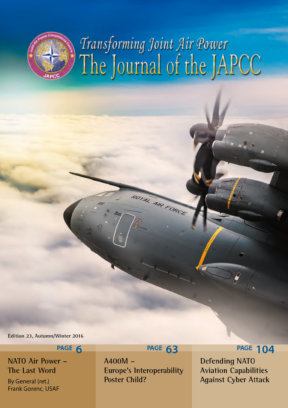Editorial
2016 was an extremely fruitful year for the JAPCC. While we continued our core business as NATO’s catalyst for the improvement and transformation of Joint Air and Space Power; some significant projects were completed and many new interesting work strands were initiated. Our ongoing efforts to improve cooperation amongst NATO, EU and national air and space organizations continue to bear fruit, evidenced by expanding participation in our annual Think Tank Forum and Joint Air and Space Power Network Meeting. With Denmark joining the team this year, the JAPCC gained its 16th sponsoring nation, which underscores the JAPCC’s value to a growing number of Alliance nations.
At the annual JAPCC Conference in October we had great discussions with many distinguished speakers and guests about the future challenges that Allied air and space power may face operating in a degraded environment, a likely scenario raised at the most recent NATO Summit in Warsaw. Another outgrowth of recent NATO summits is the development of a Joint Air Power Strategy (JAPS) for NATO. The JAPCC has been heavily involved this year in Phase I of the JAPS drafting, and the Executive Director initiated a high-level study this fall entitled ‘Joint Air Power following the 2016 Warsaw Summit – The Most Pressing Joint Air Power Strategic Priorities’, which will be conducted by a team of renowned experts and will influence Phase II of the JAPS development.
It is my great pleasure to present you the 23rd Edition of the JAPCC Journal. Themes that permeated the JAPCC’s program of work throughout 2016 include: challenges posed by contemporary and prospective threat environments, the future role of air and space power, and the requirements for developing modern, efficient, interoperable capabilities to include the associated education and training. This range of issues is well reflected in the broad selection of essays provided by external and internal subject matter experts for this Journal issue.
In the opening article of this edition, General (retired) Frank Gorenc, the JAPCC Director from August 2013 to August 2016, shares a few thoughts about the roles of air power, alliances and coalitions in the future, intending to inspire and promote the air power dialogue necessary to achieve future NATO and national aspirations. I am furthermore proud to report that Lieutenant General Michael J. Hood, Commander of the Royal Canadian Air Force (RCAF), gave us an interview in which he explains his five main goals amongst which much importance is attached to NATO integration and coordination.
Thank you for taking the time to read this edition of our Journal. I congratulate the authors on their contributions and I strongly encourage our readers to consider sharing your thoughts as you go forth and advocate for Air Power. The JAPCC team greatly appreciates your feedback and thoughts. Please visit our website at www.japcc.org, like us on LinkedIn or Facebook, or follow us on Twitter to tell us what you think.
Madelein Spit
Air Commodore, NE AF
Assistant Director








